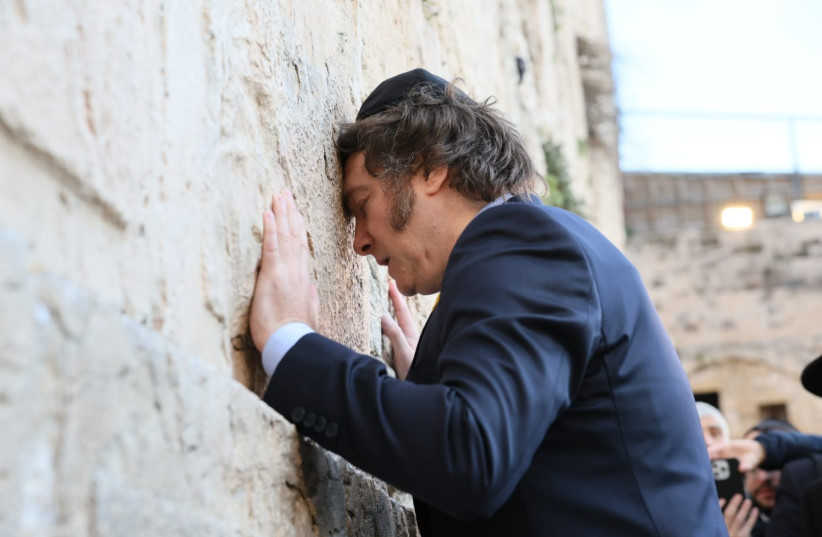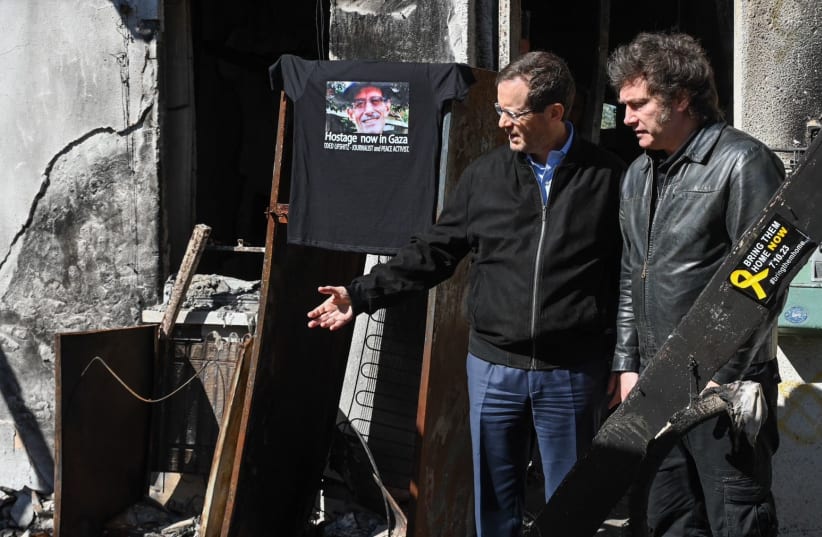Javier Milei’s rabbi to ‘Post’: How the Argentinian president fell in love with Judaism
Argentinian President Javier Milei’s February visit to Israel was part of his spiritual journey with Judaism and a quest for moral and cultural change in Argentina, Rabbi Shimon Axel Wahnish shared with The Jerusalem Post in an exclusive interview.
Wahnish, now Milei’s rabbi and his presumed nominee to be Argentina’s next ambassador to Israel, said that he first met the leader on January 28, 2022, when he knew of Milei “as a popular economist and professor.”
Milei had seen the 1956 Charlton Heston movie The Ten Commandments as a child, said Wahnish, and that he was inspired by Moses as a leader of men. The interest in the spiritual continued into adulthood, and the topic of God was brought up when the two men met.
The Rabbi’s meeting with the future president was only supposed to last for 15 minutes. The two began to speak about heavenly matters, and 15 minutes stretched into a two-hour discussion.
There was a television in the Jewish community center with a live feed of the Western Wall, or Kotel. Wahnish said that he asked Milei if he had ever been there. When Milei said that he had not visited the Jewish holy site, they made a promise to each other that Milei said came from a place higher than himself – a promise that the two would visit the Kotel together. It was a promise, that “was always remembered…From then on he started saying he had a rabbi and a spiritual guide.”

The future president started coming to Shabbat meals, “like family,” began reading the weekly Torah portion, and was a very clever and fast learner. He would ask questions about the Torah passages, engaging the rabbi in text conversations for an hour at a time. It wasn’t preaching, said Wahnish, they would arrive at “the answer to a question together through conversation.”
He summed up his conversations with Milei in a quote from the Talmudic sage Rabbi Hanina, who said “Much have I learned from my rabbis, even more have I learned from my colleagues, but from my students I have learned more than from anyone else.”
What Milei saw in Judaism was the constant search for truth and spirituality, a never-ending journey of growth. Wahnish said that was why during the Passover seder, the ceremony begins with The Four Questions, and is light on direct answers.
Harking back to Milei’s role model, Moses, Wahnish explained that the understanding that one always has more to grow and to learn is a matter of humility. Moses was great in large part because of his humbleness. He was in a position of prestige in Pharaoh’s palace but chose to leave to see what the people were feeling.
Many consider Milei to be a populist, winning support by addressing the concerns of the Argentinian people about the status quo.“Many politicians feel that the people serve you – it’s the other way around,” said Wahnish. “A lot of people see in him the hope of getting out of the crisis in Argentina.”
Economics and politics, said Wahnish, were vehicles for moral values. If he didn’t know what was right or wrong, didn’t have a strong moral compass, he wouldn’t be able to make the correct choices as a leader. Wahnish said that Milei’s real revolution in Argentina was not truly economic and political, it was cultural and spiritual.
“Even if you’re in a high position, you’re first of all a human being,” said Wahnish. “A great president has to have a great heart.”
Spiritual journey brings Argentine President to Israel
Milei’s spiritual journey continued with his trip to Israel on February 6. They had tried a few times to make the trip earlier, but Milei’s work or the rabbi’s personal challenges prevented them from doing so. With his election victory in November, Milei found an opportunity to meet his personal and public promise – his pledge that the first country he would visit would be Israel.
“Every minute of the trip we knew we were sending a message to the world; this trip transcended just us, it represents something bigger.”
One of the messages of the trip, was that to Milei promises are promises. The president was not like other politicians who are all talk, he said, if he says something, he will do it.
“I love coming here,” Wahnish said of Israel. “I’ve been there many times but the trip with the president was unique because there was so much in so little time.”
Milei’s visit to the Kotel, a long time coming, was one of his first acts when he arrived in the Holy Land. Seeing the ancient remnants of the Jewish Temple, Milei cried. Wahnish said that he was so grateful that he was overcome with emotion. “I wanted to say thanks to God for giving what he gave me,” Milei had said. One of the things that he was grateful for was a mission from God.
Offering gratitude for his election victory was another message of the trip, and the display of emotion demonstrated another message – that he was human.
“People used to think that a president is above other people, not human. We want to show that everyone has emotions and still grows spiritually and to be a better person,” said Wahnish, adding that a person cannot think clearly if they are caught up in their own ego.
This was also expressed when the president met with Israeli leaders. When Milei met with Prime Minister Benjamin Netanyahu, he reportedly told the Likud leader that he had promised to go to the Kotel and pray before meeting with him or President Isaac Herzog. Netanyahu reportedly said that it was an honor to lose priority to the Kotel.

When Milei met Herzog, Wahnish said that the Israeli president told his counterpart that the name Javier is similar to the Hebrew word for “friend,” or “Haver.” Herzog reportedly told Milei that they had a friend in the Argentinian president, not just Israel, but all Jews.
Wahnish said that the expression of friendship was experienced by Milei when they danced with other pilgrims at the Kotel, which he said wasn’t part of the program. The rabbi said that they felt the love from the Israeli public during that exciting moment.
Milei, his sister, and General Secretary Karina met several prominent rabbis during their trip, including Chief Rabbis Yisrael Meir Lau and Yitzhak Yosef.
The trip, which occurred during the Hamas-Israel war, was also a humanitarian mission, said Wahnish. Argentinian citizens had been captured by the terrorist organization and were held in captivity in Gaza. At the Kotel, Milei prayed to God for help in the release of the hostages. Sure enough, only days later, on February 12, Israeli forces conducted a daring raid and freed Fernando Marman and Luis Norbeto Har.
Milei visited Argentinian nationals and families of the victims of the October 7 massacre. “We listened and cried with them.” They also visited the Israeli border towns that had been attacked, noting that “we saw things you can’t explain with words.”
Another reason for the visit, said Wahnish, was that Milei wanted to show support for Israel following the tragedy and suffering endured at the hands of terrorists. “I think he’s one of the most supportive people of Israel.”
Milei was bringing moral clarity to the president’s office. There was a question of terrorism versus civilization, and barbarism versus democracy, and a choice had to be made. Wahnish cited Milei’s commitment to listing Hamas as a terrorist organization in Argentina. “When good and evil are so clear, you can’t stay neutral.”
Milei visited Yad Vashem, which is directed by Argentinian-born Dani Dayan, and likened the attack on the kibbutzim to the Holocaust.
“The never again of the Holocaust is now,” Milei had said according to Wahnish, who related that Milei had been the first Argentinian president to go to the Buenos Aires Holocaust Museum on Yom Hashoah and that every other administration had sent a representative instead. He recalled that Milei said that the Holocaust was part of a series of crimes against the Jewish people, and the 1992 Israeli embassy bombing and the 1994 AMIA bombing were a part of that story. He told the Argentinian Jewish community that he was doing all he could to bring the perpetrators of the bombing to justice.
The Israel trip was not Milei’s only campaign promise. During the campaign, he said he would choose the United States of America and Israel as strategic partners. Milei’s commitment to move the Argentinian embassy to Jerusalem further cemented this promise.
Israel and Argentina had a lot to offer each other. The rabbi said that Israel had a lot of technology and innovation, and Argentina had a lot of land, production capabilities, and natural resources. He praised Argentina as the best country for meat and grain. “I hope Israelis and Argentinian businesses seize this opportunity,”
Milei and himself had beheld during their trip how much the country had managed to achieve in the last 75 years, and that during the continued journey of the two states, the rabbi hoped that they could partner in the fields of health, education, counter-terrorism, and commerce.
“This,” he said, “ is a new chapter in the relationship between Israel and Argentina.”





Comments are closed.